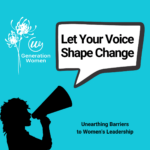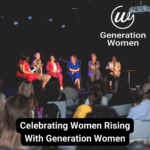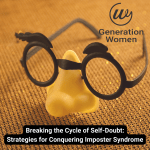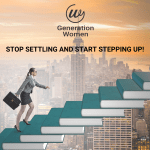Hopefully the fact that it was International Women’s Day this week hasn’t passed you by. The theme is ‘breaking the bias’. Incidentally this was one of the main reasons I started Generation Women. A growing anger and frustration got me involved in the Women’s Equality Party (and leading it in Northern Ireland for a year) and drove the creation of my business. I want to help women break past the things that hold them back in their careers so they can succeed. These days I have the honour and privilege of being surrounded by amazing women who are taking action every day to break the bias. I have asked them to share their thoughts on this year’s theme.
Contributing to this article we have Vivian Acquah (DEI coach and founder of Amplify DEI), Nuala Murphy (Interim Head of Business at Diversity Mark), Virginia Mendez (founder of The Feminist Shop), Pippa Davidson (founder of Lean In Jersey), Denise Black (a Senior HR Leader in Northern Ireland), and I’ve also included some insights from Rachel Schall Thomas (Co-founder and CEO of Lean In) from a great talk she did for the Lean In UK Council launch for International Women’s Day.
Why this year’s theme is so important
I see bias effecting the careers and lives of my friends, family, and clients repeatedly. It shows itself in a myriad of ways and often as an unconscious bias, which is obviously harder to spot, let alone to deal with. Outright sexism is sadly still alive and well, but many of us are experiencing bias day and daily, and a bit like the wallpaper in your house, it has become an invisible backdrop to life. The main thing to recognise is that WE ALL HAVE IT, but that doesn’t make it ok. It makes it everyone’s responsibility to learn and improve.
When asked if they’re biased in their approach, it’s a trait so many people believe they don’t have. Yet when you question and call out certain assumptions, behaviours and approaches many of us realize we do have unconscious bias without even knowing. Being aware of this is first step in addressing it.
Denise Black
Part of the battle is awareness, which is why International Women’s Days’ focus this year is so important as a starting point. Pippa has rightly called out that spotlighting bias “opens the door for conversation and makes us think about what bias is, and how to tackle it in the workplace. It helps us get more confident in dealing with it”. This helps us to change things for ourselves and others, and to “learn what we can do to become inclusive self-leaders and create spaces where ALL women feel included, where ALL women have a seat at the table.” (Vivian)
Examples of bias
Bias shows up in many forms, and if you’d like to know more about the types (maternal, affinity, performance bias etc.), then check out this simple overview from Lean In. One of the most important things to recognise is that the intersection of gender bias with biases against other groups has a significant impact on the person and their group.
For this article I wanted to show you some of the ways it actually shows up in our lives. When we ALL know what we’re looking for then it’s much easier to do something about it.
In meetings it often shows up as an interruption. Women are 30% more likely to be interrupted than men (by a woman or a man). It’s also common for an idea shared by a woman to go unacknowledged and for it to be raised later and wrongly attributed to the person that reshares it.
Bias looks like giving women housework in the workplace…asking her to organise the coffees for a meeting, take notes, tidy the kitchen, organise social events and the like. I almost laugh writing these things down thinking surely this doesn’t happen still, but yes it does (my clients tell me)!
It’s assuming the woman in the room or on the call is the junior and the man the senior. It’s the conversation about the woman who just got married and someone saying “she’ll be off on maternity leave before we know it, are you sure she’s the right person”, or worse than that assuming her commitment will be lower without even knowing (at least the comment can be called out)!
It’s workplace BANTER where you’re told to get a sense of humour if you don’t laugh, or dare to call it out!
Bias is being told “it’s dirty work, you won’t want to do that” when it’s your job and that’s exactly what you’re there to do. It’s her voice being described as shrill while he’s praised for being authoritative. It’s your credit being given to a man when you did the work.
I know I don’t need to say this, but I will just in case it’s not 100% clear…none of this OK! In fact it’s a long way from that. Small behaviours and actions add up to a culture and society that undervalues and mistreats women.
What can we do – and personal action
International Women’s Day is a day of celebration. It’s also a day to make a personal commitment to drive change forward. We can all take action! One of my commitments is to actively include diverse voices in my own work, so I can help provide better resources for you. This article is the first of many, and thank you to all the contributors for the following suggestions.
When it comes to taking action, it’s like most things…small steps can yield big results. Here’s a few ideas:
- Pay attention to when a woman gets interrupted – be her ally and call it out. The simplest way is to say ‘I don’t think Anjali had finished speaking, can we let her finish and come back to your point’, or ‘I really want to hear more about what you were saying Marissa, can we let her finish and then hear from you’. Even better if you agree a no interruption rule.
- Review your invite list for meetings “have you invited everyone who actually has a stake in the project? Are all those voices at the table? Have you thought about making sure the people are bringing diverse perspectives and experiences?” (Rachel)
- Amplify another woman’s idea. When she makes a key point in a meeting, repeat it, give her credit, and thank her. (Nuala)
- Educate yourself by reading important books, such as; Right Within by Minda Harts, How to be an inclusive leader by Jennifer Brown, Building for everyone by Anni Jean-Baptiste, How to listen and How to be heard by Alissa Carpenter,
Subtle acts of exclusion by Tiffany Jana and Michael Baran. (Vivian) - The most important but often difficult thing is to have the conversation. This can be scary and I think often we worry about whether we can, whether we have the right words to use or the right forums, however, I think if you are open and have these conversations with the right intentions then people understand that and you will learn along the way. Saying nothing will ultimately change nothing. (Pippa)
- Highlight other women’s skills and accomplishments, share positive feedback with her manager. If you think a woman deserves a promotion, make your case to her team leader (Nuala)
- Be focused, be determined and unwavering in your ambition. Many women at work, or friends I know, overthink things. I think this is in our nature as women. By second and third guessing our selves and overthinking all the options, you often find you don’t end up where you wanted in the first place and you’ve used a lot of energy not getting there. So my advice is to consciously challenge yourself and follow your gut and go for it! (Pippa)
What businesses need to do
Training
We need to demystify bias and we need to demystify allyship, we don’t necessarily understand what these words mean and what bias looks like, what practising good allyship looks like”. Lean in have produced two great training programmes that are free to access online with the goal of “helping people feel comfortable taking action.
Rachel Schall Thomas
Lean In provide lots of useful resources that businesses can tap into such as 50 ways to fight bias and Allyship at Work, but don’t expect women (or any other marginalised groups for that matter) to take you seriously if you rely entirely on free resources and employee-led initiatives! Show you’re serious and care by investing in resources and support that will have an impact.
Vivian suggests that “if businesses were focusing on just one thing this year, I would say it’s time to unlock empathy. It’s time to unlock an essential ingredient for people to start their DEI journey. The safest way to do that is by using impactful virtual reality training such as the Amplify Empathy training so that people can activate themselves to become inclusive self-leader.”
Decision-making
It’s not good enough to pay lip-service to DEI. It needs to become an intentional action until it becomes out unconscious norm. We really need to “make every decision through a DEI lens. Make sure you think through how this decision will effect others and whether it excludes or isolates others. To promote DEI as a mind set as opposed to limiting it to a specific target or minority group.” Denise
The simplest way of being more inclusive is to increase the diversity of people involved in decision-making. You automatically get a diversity of experiences, perspectives, and ideas. If you look round the room (or the screen), and all of the faces looking back at you are similar, then decision-making will be poor and exclusive.
Communication
Its the most important thing we can do. Everything hinges on getting better at talking to each other. The key is to create a safe environment that fosters open communication.
If we listen and talk to our employees then we learn more about each other and can build understanding, knowledge and develop changes in our business as needed. By learning together, we learn from each other and ultimately by communicating you can bring your teams on a journey with you. In setting a strong corporate culture around D&I, communicating these values from the top is essential.
Pippa Davidson
It’s more than one day
Ultimately the aim of International Women’s day and #breakthebias is to highlight all of these issues and solutions on a day that there is a focus on it (in the media in particular). But it needs to just be the start. It can’t just be one day…real change is an every day challenge!
Let’s remember equality will never be reached if we do the work only once a year. Now is the time to get energised, informed and hopeful. This time of the year is important, but small hinges open mighty doors. It’s important to keep the conversations and activism up so step by step we keep moving forward!
Virginia Mendez – The Feminist Shop
Many of the contributors to today’s article can help you progress the DEI efforts of your organisation. Vivian is a DEI coach who delivers direct support and impactful training programmes. Nuala supports organisations to achieve the Diversity Mark Virginia is an author of multiple books that help us challenge gender bias. All of the contributors are highly skilled speakers. And of course I (Sinead) can help you with innovative ways to support the women in your workplace to level up their careers and confidently step up into leadership.







